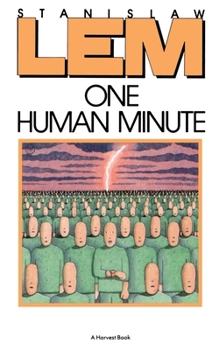One Human Minute
Select Format
Select Condition 
Book Overview
Contains three essays--"One Human Minute," "The Upside-Down Revolution," and "The World as Cataclysm"--from science fiction master Stanislaw Lem.
Format:Paperback
Language:English
ISBN:015668795X
ISBN13:9780156687959
Release Date:November 1986
Publisher:Houghton Mifflin
Length:112 Pages
Weight:0.28 lbs.
Dimensions:0.3" x 5.0" x 7.9"
Customer Reviews
2 ratings
definitely recommended
Published by Thriftbooks.com User , 18 years ago
I recommend the first essay to anyone; it is a beautifully written and insightful description of humanity from a point of view I tend to agree with, and uses quite a bit of very interesting data which I have a hard time imagining how Lem got a hold of (unless of course it was all fabricated, but that would generally defeat the point of the essay). The book is conveniently short (the copy I read was 102 pages), but it's clear Lem did not leave out anything for brevity's sake. Each essay takes up a third of the book, but what I take issue with is their placement. The first is by far the most interesting and philosophical, while the next is still quite creative but has much less in the way of social commentary and much more in the way of technical speculation. The second essay is simply a speculative history of 21st-century warfare, and while very creative, cannot compare to the depth of the first. The third is entirely out of the realm of science fiction or philosophy, instead discussing the string of unlikely occurrences leading to the development of life on earth and subsequently of humanity, and while certainly very well thought-out, is much more dry than the other two and seems to belong more in a scientific journal than its present location. Thus the book as a whole is almost anti-climactic after the essay which comprises the first third, departing from the general (and rational) writing technique even Lem seems to have adopted of constructing texts so as to pull the reader towards the conclusion. Contrary to the official book description, only the first of these purports to be a review of a nonexistent book; the second simply claims to summarize a secret archive of books from the future, while the third is an essay on cosmic history and the unlikeliness of extraterrestrial intelligence. The title essay, at least, easily equals Lem's best works such as Fiasco, and I expect it to appear commonly in philosophy classes someday.
STATISTICAL TRUTH
Published by Thriftbooks.com User , 18 years ago
Stanislaw Lem is one among the few authors to look frankly at the human condition, define the perceptual boundaries that shape our awareness, our cultures and our potential, and tell us that, despite our nearly crippling ways of being, what we have we must hold dear. "One Human Minute" is only one aspect of this dressed-down yet curiously uplifting view of being human, adding a statistical perspective to his perhaps better-known characterizations of isolation, loss and pain. "Solaris" and its mirror "The Invincible", as well as the staggeringly dark "Fiasco" each demonstrate the variety, texture and opacity of the walls which make us what we are while simultaneously delimiting our awareness of outer and inner existence. The persistence of these works in bringing the reader face-to-face with unknowability should drive out many of the preconceptions on which we base our sense of self. Free of the musical ditties that, with drowning sentimentality falsely reassure us close encounters of any kind will forever be of the all-singing, all-dancing variety, Lem tells us instead that we are each on our own and that there's really nothing all that terrible about it. As long as we recognize the limitless limitations. "One Human Minute" provides a less emotional exploration of our being. Here, Lem puts us objectively in our places -- one among the masses, defined by shared parameters, weights and measures that cut deeply into our personal sense of "uniqueness". It is a bracing perspective, one that is hardly popular, despite being the only cure for our species' overbearing, top-of-the-foodchain hubris. He is gone now, but his work and his ideas will continue to compel anyone willing to openly think about what it means to be, to see the world with less of a tint. Or is it taint?






